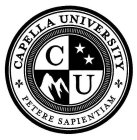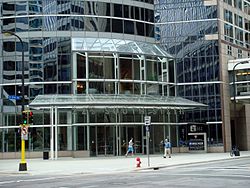Capella University
 | |
| Type | Private , For-Profit (Nasdaq: CPLA) |
|---|---|
| Established | 1993 |
| President | Scott Kinney,[1] |
| Students | 37,553[2] |
| Undergraduates | 23 percent[2] |
| Postgraduates | 76 percent[2] |
| Location | , , |
| Campus | online |
| Website | www.capella.edu |
Capella University is a for-profit co-educational university with partial residency requirements during the course of study, based in Minneapolis, Minnesota.
The school is owned by the publicly traded Capella Education Company. Capella University offers bachelor's, master's (MS and MBA) and doctoral (PhD, PsyD, and DBA) degrees in business, information technology, education, psychology, public health, public safety and human services.
Within those areas, Capella has 143 graduate and undergraduate specializations and 17 certificate programs with over 1690 online courses. More than 37,000 students are enrolled from all 50 states and 59 other countries, with 32% enrolled in doctoral programs, 44 percent enrolled in master's programs, and 23 percent enrolled in bachelor's programs. A faculty of 1,615 professors with 85 percent holding doctoral degrees. Capella faculty live in 47 states and 5 foreign countries.[2]
History
What is now Capella University was established in 1991 by Dr. Harold Abel and Stephen Shank, former CEO of Tonka, who believed adults were an academically underserved population by traditional universities.[3]
In 1993, Abel, a former president of three universities, became the first president of the Graduate School of America. This school was later renamed Capella University.[3]
In April 1996, Capella (at the time TGSA - the Graduate School of America), launched its website and online program developed by Steve Arakawa (Webmaster and course developer), under the direction of Bruce Francis (President).
In 1997, Capella University received regional accreditation.[3]
In 1999, the parent company and university were renamed to Capella Education Company and Capella University, respectively.[3]
In 2000, the Capella University began to offer bachelor's degree programs for the first time.[3]
In 2006, Capella Education Company became a publicly traded company (NASDAQ: CPLA).[3]
In 2007, Capella was named one of 86 higher education institutions in the United States to have received the National Centers of Academic Excellence in Information Assurance Education (CAEIAE) designation by the National Security Agency (NSA). The designation is valid for the academic years 2007 through 2012.[3][4]
In March 2008, Capella Education Co., longtime occupant of the 225 South Sixth skyscraper in downtown Minneapolis, signed a new lease that expanded its office and renamed the building Capella Tower. The building houses all of the company's 1,150 downtown Minneapolis administrative staff.[5][6]
In 2009, The Project Management Institute (PMI) Global Accreditation Center for Project Management (GAC) accredited two Capella University online degree programs: the MS in Information Technology with a specialization in Project Management; and the BS in Information Technology with a specialization in Project Management.[7]
In 2009, Capella launched its School of Public Service Leadership.[8]
In 2010, Capella, along with three other schools, was awarded the CHEA Award for Outstanding Institutional Practice in Student Learning Outcomes by The Council for Higher Education Accreditation.[9]
Enrollment

Capella University had an open enrollment admission policy until November 2010, which only required proof of a high school diploma, GED or its equivalent[10] for undergraduate admission. Currently, undergraduate applicants who do not have any credits eligible for transfer must successfully complete a university-approved examination to be considered for admission.[11]
Capella's enrollment is composed mainly of graduate students including 45 percent MS/MBA students and 31 percent PhD/PsyD doctoral students. The undergraduate population of Capella makes up 23 percent of the student body. Less than one percent are working on certificate programs. The average age of a Capella student is 40. Ninety-four percent of students are enrolled part-time, 74 percent are female, and 54 percent are ethnic minorities.[2]
Learning environment
As an online university, the majority of learning takes place via the Internet. Capella's online environment is organized into course rooms, with each course utilizing its own individual component. These course rooms are built on the Blackboard Learning System software. There are also residency requirements for certain graduate programs such as a one-year residency for clinical psychology and residencies for other master's and doctoral programs. For example, PhD programs require three long-residencies (called Colloquia) spaced throughout the program.
Capella provides applicants opportunities to earn a limited number of credits through a prior learning assessment program, which can provide college credit for experience-based learning.[12][13]
Rankings
2010 Global Language Monitor ranked the school as No. 3 Online University and No. 140 University overall on the TrendTopper Media Buzz list of the nation’s Top 300 Colleges and Universities.[14]
According to the 2010 National Survey of Student Engagement (NSSE), Capella exceeds the national average among colleges and universities in the level of academic challenge offered to its students, and in providing a supportive campus environment.[15]
Accreditation
Capella University has regional accreditation by the Higher Learning Commission of the North Central Association of Colleges and Schools.[16][17]
Capella participates in the North Central Associations (NCA) Academic Quality Improvement Program (AQIP).The normal accreditation review process is every ten years, member schools who participate in the AQIP program have their accreditation reviewed yearly. AQIP is a form of lean management or process improvement for education.[18]
Capella's Master's of Science degree programs in Mental Health Counseling, Marital, Couple, and Family Counseling, and School Counseling are accredited by The Council for Accreditation of Counseling and Related Educational Programs CACREP.[19]
Capella University's Bachelor of Science in Information Technology programs are accredited by ABET.
Notable people
The following is a list of notable Capella University people. It includes alumni, professors, and others associated with Capella University. This is an incomplete list, which may never be able to satisfy particular standards for completeness.
This section needs expansion. You can help by adding to it. (June 2010) |
- Dr. Curtis J. Crawford, American computer systems engineer and CEO
- Christopher Erhardt, American video game designer and retired professor
- Roger L. Kemp, MPA, MBA, PhD, Visiting Scholar, Capella University, 2008 to Present. Dr. Kemp served on several doctoral dissertation committees.
- Don Nicholas, American publisher and information architect
- Richard Rios, U.S. Republican political activist (non-graduate)
- Dr. Betty Schueler, American author and computer consultant
- Dr. Gerald Schueler, American author and retired Systems Analyst
- Rafael C. Castillo, PhD, First Editor of ViAztlan: a journal of Chicano Arts and Letters
- Dr. Rhadi Ferguson, 2004 United States Judo Olympian, 4-Time National Judo Champion, Only PhD Male and also the only African American PhD Mixed Martial Arts Fighter to fight in a major organization Strikeforce. Dr. Rhadi Ferguson is also a master educator, trainer, teacher and coach.[20]
Controversy
This article's "criticism" or "controversy" section may compromise the article's neutrality. (April 2010) |
In 2006, a compliance audit was commenced by the United States Department of Education, Office of the Inspector General (OIG) focusing on the university's policies and procedures concerning the return of Title IV funds as required by Federal Law for students who failed to give official notice that they were withdrawing from the school.[21] The OIG contends that Capella made accounting mistakes in how it calculated student eligibility for government-subsidized loans, including failing to return all funds disbursed on behalf of students who dropped out before their first day of class.[22] Capella University, in a response to the audit, says it recognizes some past shortcomings in its accounting practices and made changes to ensure that such errors are not repeated.[22]
References
- ^ Capella University. "University Mission & Leadership". Retrieved March 31, 2010.
- ^ a b c d e f [1]
- ^ a b c d e f g Capella University website
- ^ NSA Press Release, June 28, 2007
- ^ Sam Black, Capella lease to rename 225 South Sixth, Minneapolis / St. Paul Business Journal, March 20, 2008.
- ^ Capella University website
- ^ Capella Web site
- ^ Capella Web site
- ^ "News Release January 8, 2010". CHEA. 2010-01-08. Retrieved 2010-07-26.
- ^ "Capella University". Careertoolkits.com. Retrieved 2010-07-26.
- ^ "Capella University Admission Requirements" (PDF).
- ^ "College Navigator - Capella University". Nces.ed.gov. Retrieved 2010-07-26.
- ^ "Capella University - Earn credit for prior learning and transfer credits". Retrieved 2010-08-24.
- ^ [2]
- ^ [3]
- ^ Council For Higher Education website
- ^ The Higher Learning Commission website
- ^ Academic Quality Improvement Program website
- ^ Capella University website
- ^ Rhadi Ferguson
- ^ "Capella University's Compliance with Selected Provisions of the Higher Education Act of 1965 and Corresponding Regulations: Final Audit Report" (PDF).
- ^ a b "Capella University Overcharged Student Lenders $588,000, Audit Finds". Retrieved 2008-03-14.
